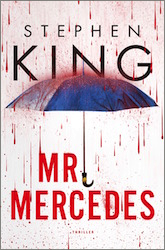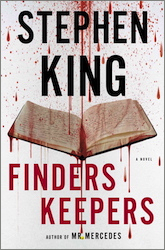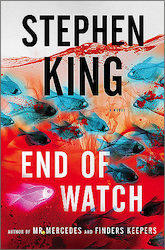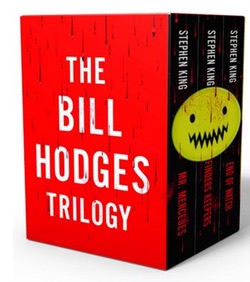Stephen King loves crime fiction. His first completed novel, Rage, was about a kid holding his high school class at gunpoint, and the novel he wrote right before Carrie was Blaze, the story of a kidnapping gone wrong. Several of his early short stories were crime stories (“Stud City,” 1969; “The Fifth Quarter,” 1972) and when he gave his speech accepting the National Book Award in 2003, he singled out for praise a handful of authors he believed were deserving of more attention, most of them crime and thriller novelists like Elmore Leonard, John Grisham, Mary Higgins Clark, and Michael Connelly.
Richard Branson wants to be an astronaut and so he built a spaceport in New Mexico. Stephen King wants to be a crime novelist, and so he published his Bill Hodges Trilogy: Mr. Mercedes (2014), Finders Keepers (2015), and End of Watch (2016). If there’s one thing that we, as Americans, will die to defend, it’s the inalienable right of every rich person to live their dreams, and the first book in the trilogy, Mr. Mercedes, even won the coveted Edgar Award for Best Novel from the Mystery Writers of America. So now Stephen King is a crime writer, and god bless America. The only problem is, he’s not a very good one.
For decades, book critics were content to punch Stephen King in the stomach as they walked past him on their way to hang out at Philip Roth’s parties. The thinking was that, yes, they were ignoring one of the most popular writers in America, but he had giant piles of money to mop up his tiny teardrops. “You can have money or respect, King!” they sneered as they gave him atomic wedgies. “But you’re not getting both!” Then Stephen King won the National Book Award, and critics started to think, “Maybe belittling a guy who’s sold a few hundred million books makes us look petty?” Now they wildly overpraise him. He is “America’s greatest natural storyteller,” and “one of America’s finest writers,” and “a rhapsode in the ancient mould” according to the reviews for Mr. Mercedes.
Mr. Mercedes kicks off with a scene so compelling that it echoes through all three books: desperate people wait on line in a parking lot for a job fair to begin so they can throw themselves on the mercy of potential employers. As the line of recession victims grows longer, a lunatic drives a Mercedes-Benz into the crowd and kills eight people, injures dozens more, then zooms away. The police are not only impressed by the killer’s knack for symbolism, but also by the fact that they can’t catch him. It’s a great scene, and Mr. Mercedes definitely starts off by putting its best foot forward. Unfortunately, that’s its only foot.
Cut to: a couple of years later and Bill Hodges, the detective on the case, is retired and putting his gun in his mouth a lot because that’s what retired cops do in books like this. But then the Mercedes Killer sends Bill a taunting letter and Bill realizes that he must regain his dignity, lose weight, and solve the crime or he is not the lead character in a crime series.
 By page 42, we’ve met the Mercedes Killer, Brady Hartsfield—and if you thought Bill Hodges was a cliché, wait until you see this guy. Hartsfield is Norman Bates 2.0, working in an electronics store, living with his mother, having sex with his mother, and driving an ice cream truck. He’s also a racist. The only thing he doesn’t do is dress up as a scary clown and drown kittens. The rest of the book is a race against time between Hodges and Hartsfield as the former Mercedes Killer decides to commit one more crime because that’s what crazy killers do in books like this.
By page 42, we’ve met the Mercedes Killer, Brady Hartsfield—and if you thought Bill Hodges was a cliché, wait until you see this guy. Hartsfield is Norman Bates 2.0, working in an electronics store, living with his mother, having sex with his mother, and driving an ice cream truck. He’s also a racist. The only thing he doesn’t do is dress up as a scary clown and drown kittens. The rest of the book is a race against time between Hodges and Hartsfield as the former Mercedes Killer decides to commit one more crime because that’s what crazy killers do in books like this.
And that’s this series in a nutshell: characters and incidents lifted from other books and reassembled into a passable but hardly compelling collage. From Ed McBain, King has taken the nameless city in which his book is set. From Robert Bloch he’s taken Norman Bates and turned him into Brady Hartsfield. From Stieg Larsson he’s taken the dysfunctional genius computer hacker and given her to Hodges as a sidekick in the character of Holly Gibney, a middle-aged computer genius in the body of a teenaged girl who’s one of those super-powered autistic people Hollywood loves. From The Cosby Show he takes Theo Huxtable and gives us Jerome, a loyal and brave African-American teen given to hijinks and outbursts of Stepin Fetchit dialect.
There’s also a love interest in Mr. Mercedes, in the form of a sexy sister of a former suspect who happens to have a thing for middle-aged, out-of-shape ex-cops, although within four pages of her first appearance you can see King measuring her to make sure she fits the refrigerator he plans on stuffing her into later. All told, Mr. Mercedes is a book about a cliché, hunting an even more blatant cliché, while assisted by a series of clichés.
But King hasn’t written close to 70 novels for nothing. His voice is easy on the ears, he makes even the rehashing of clues pass painlessly, and he’s able to efficiently summon a sterile McMansion or a cheap Italian restaurant in the wrong part of town with a handful of telling details. Things move quickly, and King gooses the plot along with outrageous coincidences whenever it starts to get boring, but that’s like saying, “My husband isn’t as ugly as his brothers, and he’s never tried to kill me in my sleep.” It’s pretty faint praise.
 Debuting at number one on the New York Times bestseller list, Mr. Mercedes dropped out of the top ten after eight weeks, and fell off the list entirely after eleven weeks, a little under par for a Stephen King novel these days, most of which hang on in the top ten for at least ten weeks. It’s better than the sequel, Finders Keepers, which debuted at number one, dropped out of the top ten a week earlier, and fell off the list entirely at ten weeks. That may be because it’s an even less substantial book than Mr. Mercedes.
Debuting at number one on the New York Times bestseller list, Mr. Mercedes dropped out of the top ten after eight weeks, and fell off the list entirely after eleven weeks, a little under par for a Stephen King novel these days, most of which hang on in the top ten for at least ten weeks. It’s better than the sequel, Finders Keepers, which debuted at number one, dropped out of the top ten a week earlier, and fell off the list entirely at ten weeks. That may be because it’s an even less substantial book than Mr. Mercedes.
Without the bravura opening of the first book, Finders Keepers has Bill Hodges, Jerome, and Holly forming a detective agency called Finders Keepers, and this time they’re on the trail of a killer who’s obsessed with the notebooks he stole from a reclusive writer named John Rothstein back in 1978. Rothstein became the voice of his generation with his character Jimmy Gold, who’s given to catchphrases like “Shit don’t mean shit.” The killer, Morris Bellamy, murdered Rothstein in a bungled robbery, stole his cash and his notebooks (he’s his number one fan) before going to prison for unrelated crimes. While he’s in the clink, a little kid found the notebooks and cash and also became obsessed with Jimmy Gold, then Bellamy gets out of the slammer and Hodges and the whole Scooby gang have to rescue the kid from his clutches.
Rothstein is basically J.D. Salinger crossed with John Updike and most of the characters in the book feel similarly cut and pasted. The language is uncharacteristically second-hand and clunky. One chapter ends with, “Pete lay awake for a long time that night. Not long after, he made the biggest mistake of his life.” Not only is “the biggest mistake of his life” a phrase so worn out it’s practically meaningless, but that repeated “long” is the kind of sloppiness that’s not at all like King. In a literary Hail Mary, the book ends with the comatose Brady Hartsfield reappearing and displaying previously unknown psychic powers.
 And so we come to the generically titled End of Watch, published in 2016 and originally called The Suicide Prince, which is far more evocative. Hartsfield has developed psychic powers because his evil doctor is experimenting on him with an untested drug that’s given him psychic superpowers. Bill Hodges has pancreatic cancer and hides his terminal diagnosis from everyone. A videogame controls people’s minds and makes them kill themselves. As Hartsfield masterminds a complicated and awkward revenge plan we get to deal with some of the most hackneyed writing of King’s career. Holly is someone who “thinks outside the box, sometimes way outside it” and her eyes are “beautiful and full of intelligence”. Hartsfield develops a phantom hand like the main character in Duma Key, he uses incontinence as a form of revenge against his caretakers, as in Dolores Claiborne, and the people he psychically manipulates become dirty and unkempt, like the people “pushed” by Andy McGee in Firestarter. Characterization is inconsistent (cops go behind their partner’s backs and then give lectures on partner loyalty) and previously undisclosed evidence pops up as needed.
And so we come to the generically titled End of Watch, published in 2016 and originally called The Suicide Prince, which is far more evocative. Hartsfield has developed psychic powers because his evil doctor is experimenting on him with an untested drug that’s given him psychic superpowers. Bill Hodges has pancreatic cancer and hides his terminal diagnosis from everyone. A videogame controls people’s minds and makes them kill themselves. As Hartsfield masterminds a complicated and awkward revenge plan we get to deal with some of the most hackneyed writing of King’s career. Holly is someone who “thinks outside the box, sometimes way outside it” and her eyes are “beautiful and full of intelligence”. Hartsfield develops a phantom hand like the main character in Duma Key, he uses incontinence as a form of revenge against his caretakers, as in Dolores Claiborne, and the people he psychically manipulates become dirty and unkempt, like the people “pushed” by Andy McGee in Firestarter. Characterization is inconsistent (cops go behind their partner’s backs and then give lectures on partner loyalty) and previously undisclosed evidence pops up as needed.
King’s written about aging and dying a lot in his recent books, and the most interesting parts of this trilogy revolve around Hodges’s mortality. But ultimately, detective fiction doesn’t feel like a fit for King, maybe because plot has never been his strong suit and detective novels are largely plot-driven. He’s always been far more interested in character, and that may account for why this trilogy feels so clunky in his hands. Or it may be because King was a fan of crime fiction first and, like Annie Wilkes in Misery, fans don’t necessarily make the best writers. Either way, EOW debuted at number one on the New York Times bestseller list and stayed there for three weeks, the only book in the series to hold the top spot for more than a week. But it dropped off the list just as quickly as the others, falling out of the top ten after nine weeks, and disappearing from the list altogether by week eleven. And that’s what these books do, too. They hang around in your mind while you read them and then, a few weeks later, you try to remember the details but *poof* they’re gone.
This article is adapted from an earlier review of Mr. Mercedes, originally published in June 2014.
Grady Hendrix is the author of Paperbacks from Hell, a history of the horror paperback boom of the Seventies and Eighties, as well as My Best Friend’s Exorcism, and Horrorstör.










